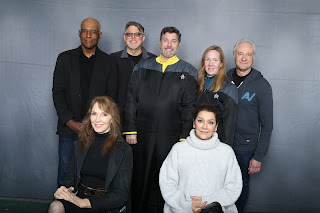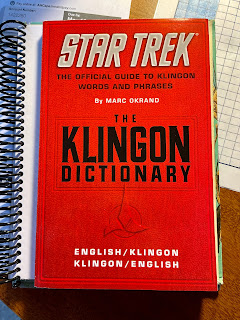Technology and Artificial Intelligence
What Star Trek technology is on your list of must-haves? Could the Star Trek universe exist without this type of technology? How would it be better (or worse) with (or without) this technology? Be sure to use evidence to support your argument.
My favorite Star Trek medical moment takes place during my favorite Star Trek film, The Voyage Home (known colloquially in our home as Star Trek: Whales). When Bones approaches the woman on the gurney and finds out she's there for kidney dialysis, he gives her a pill ("What is this, the Dark Ages?!) and tells her to call him if she has any problems. Later, we see her being wheeled down the hall, surrounded by a medical team, exclaiming, "The doctor gave me a pill and I grew a new kidney!" Every time I see this, I think about all of the people waiting on organ-donation lists, and all of those who don't make it to see the day when a new organ becomes available for them. I also think about all of those whose lives are disrupted by the need for dialysis. It may not be a "technology" in the strictest sense of the word, but whatever that pill is would be my pick for a must-have medical intervention from the Trek universe. Of course, Star Trek could exist without it, but it's so emblematic of the humane future Gene Roddenberry has created for us.
Second place, since I've decided to get medical with this question, would be Geordi's VISOR. I actually love that the VISOR is presented as an imperfect solution, even in a future with so many possibilities. And the process of Geordi getting his implants has its ups and downs. Medical technology in Star Trek is almost never presented as simplistic, or magical, or used to avoid the need to resolve important plot points. If it were, I think it would detract from the realism (yes, realism) of the show. Medical ethics around technological and scientific limits give us some of our most interesting Star Trek moments, as when Worf's spine is damaged and, upon learning that he is paralyzed, he asks Riker to assist him in dying by suicide.
Medical technology is integral to the Trek universe. Without it, the show would have fewer "human" moments, be less thought-provoking, and have a less emotionally-rich landscape. It's my favorite science on the show. And you will never get me on a transporter pad.
Where do you see Artificial Intelligence going? Will it be Data, The Doctor or something new? Do we need to fear it, embrace it or something in between?
I guess, first, I need to acknowledge that I don't use Siri, have a smart house, or own an Alexa. We don't even use a Roomba. I have enough privilege to be able to have and use any or all of these things if I wanted them. I don't want them. So far, I just haven't felt the need. I do, however, think it's neat when an AI beats Jeopardy or wins at chess. It's fascinating to consider whether a chatbot can (or has) beaten the Turing test. And I'm not opposed to a voice user interface on principle. I mean, this is one the greatest Trek moments of all time:
That being said, I don't know where AI will go from here. I do hope it's along the lines of the hotel concierge example Mark Terrlink gave in the lecture video. AI's best purpose, to me, is to handle repetitive tasks and inquiries well, while knowing when to bring a human into the interaction. As Mark says, targeted and specific AI, trained well to its specific purpose, is the ideal. I'm not sure what he meant by "unsupervised" AI being a bad idea, but it sounded a little ominous. Could AI really develop sentience as we understand it? And why do we have so many depictions of the sentience being malevolent? The recent introduction of Zora on Star Trek: Discovery and the fear she was initially greeted with by some of the crew, was an interesting and ethically complex storyline. Even V'GER, the Voyager 6 probe in Star Trek: the Motion Picture, was inadvertently threatening due to its confusion about its self-awareness and uncertainty of purpose. And let's not even talk about what happens when you ask your holodeck to create a villain capable of intellectually besting an android.
Speaking of Data (and we can add in the EMH/The Doctor as the other Trek AI made in our own image), I love the storylines about these artificial intelligences seeking to expand their own humanness. Data trying to understand humor is one of the funniest things I've seen, and a lovely meditation on humor as humanity. Data's emotion chip and The Doctor's holographic family expand the boundaries of how technology could level-up consciousness and feeling. Watching these episodes always makes me think about what it means to be human. More fundamentally, as Mark Terrlink says, well-developed and "trained" AI can help humans be more human by removing routine tasks from our daily burden and allowing us to be more connected and creative. Is that really what we do with the "extra" time? Well, the results from the hotel concierge study seem promising, with staff and guests being happier. But the (unscientific) vibe I get is that having AI causes us to interact with our devices more and one another less. I don't think AI is to be feared or revered, but used judiciously.






Comments
Post a Comment